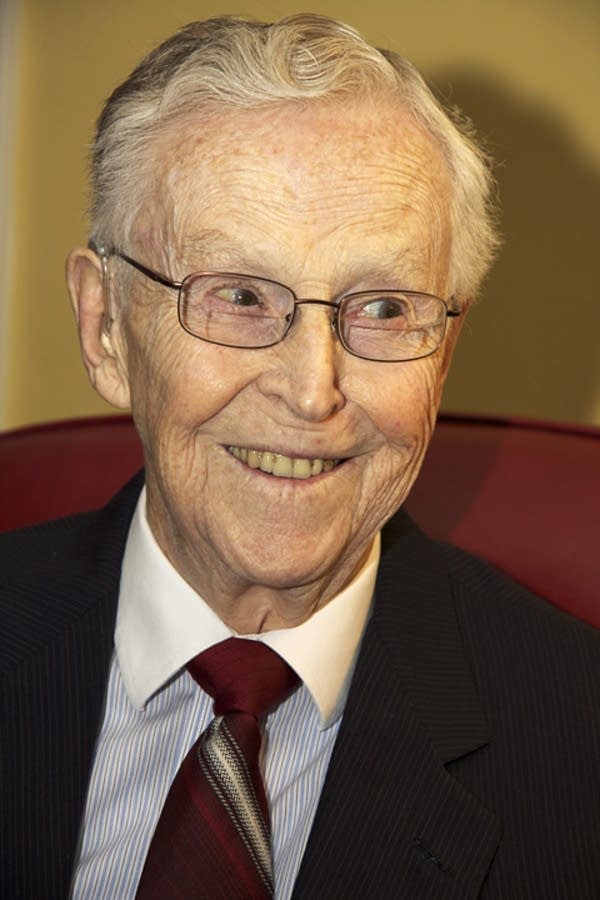John Finnegan, former Pioneer Press editor, dies at 87
Go Deeper.
Create an account or log in to save stories.
Like this?
Thanks for liking this story! We have added it to a list of your favorite stories.

The longtime editor of the St. Paul Pioneer Press newspaper and a champion of open government in Minnesota has died.
John Finnegan, who worked at Minnesota papers for more than 40 years, died Tuesday morning at his home in St. Paul. He was 87.
Finnegan also helped write landmark legislation that still defines what Minnesotans can and can't know about their government.
Finnegan was born in 1924 in Walker, Minn. where his family owned the landmark Chase Hotel. He worked as a bellboy, as a housekeeper and even a fishing guide on Leech Lake.
Turn Up Your Support
MPR News helps you turn down the noise and build shared understanding. Turn up your support for this public resource and keep trusted journalism accessible to all.
But he loved the news.
"I put out my first newspaper in the 7th grade," Finnegan told MPR reporter and journalism historian Jon Collins in 2011. "Actually what I did was a man on the street for the Hindenburg disaster. That was my first big story, I guess. I didn't know much about it, except what I'd heard on the radio. So that was really my first experience as a journalist."
Finnegan pursued his life's work while he was a soldier during World War II; at papers in Robbinsdale and Rochester; and starting in 1951 as a reporter at the Pioneer Press. His son, John Jr., said he took more than a professional interest in public affairs.

"He co-authored, with a colleague, Minnesota's first open meetings law, in 1957," John Finnegan Jr. said. "That was long before Watergate, and it was on his mind that public employees should be accountable to the public, and the best way to be accountable to the public is to assure that they have to hold their meetings in public."
Finnegan rose through the ranks of the newsroom to become executive editor — the newsroom's top manager — in 1970. He continued to rise through the executive ranks until his retirement in 1989.
The paper under Finnegan, and his successor as editor Deborah Howell, won two Pulitzer Prizes for stories about the farm crisis and AIDS in the 1980s.
Friends also remember Finnegan for his earlier work, off the front page. In the mid-1970s, he responded to the Watergate scandal with a push for yet more transparency in government nationally and in Minnesota. Experts credit him with the presumption in Minnesota that government data is public -- rather than the exception.
"I figured if it was public information -- if it was given to the public, or for the public, it ought to be available to the public," Finnegan said in the 2011 interview. "With some exceptions. I never did suggest that we go after income tax records, or that we go for health records of individuals."
Finnegan said it wasn't just a matter of government being open to his and other news outlets, but to voters, taxpayers and residents, as well.
"I certainly thought that criminal and justice information ought to be public, activities of a government agency, in order to tell the public whether or not these people are actually performing their jobs properly," he said.
Don Gemberling served as the state official who often interpreted the Minnesota Data Practices Act. Gemberling, now retired, said he'll remember Finnegan for his sense that open government wasn't a privilege.
"A real important part of John's legacy to me was that he was absolutely consistent on the idea that the media shouldn't have, didn't want, any more access than the general public ought to have," he said.
That legacy has already been recognized, with an annual award for advocates of open government in Minnesota, named after Finnegan.
Finnegan also remained true to his roots all his life, was an avid fisherman and family man. He leaves behind his wife of 64 years, Norma, as well as five children, 11 grandchildren and a great grandchild.
Funeral services are pending.
---
• Follow Tim Nelson on Twitter: http://www.twitter.com/timnelson_mpr




